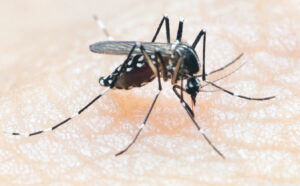Column by Dr. Richard Sternberg
West Nile Virus

To add to all the other viruses that we have had to think about, COVID, monkeypox, polio, we can add West Nile Virus (WNV) which is now endemic in the New York City area.
This is not yet affecting us in Otsego County and surrounding areas and probably won’t. While it is transmitted to humans by mosquitos, the reservoir, the source and reproduction site for the virus is various bird species. There is no treatment but the most obvious prevention is to kill the mosquitos that infect people.
In the city, NYC health officials found the virus in mosquitos in over 1,100 pools of water. They have initiated widespread spraying to kill them. Additionally, epidemics of WNV die off where the weather is too cold for the mosquitos.
You may ask why I am writing my column about West Nile Virus. It’s in NYC and unlikely to spread this far upstate. This disease is personal to me. My brother died of it.
In the summer of 2015, my brother was alternately in two areas where the virus was present, Brooklyn and the south shore of Long Island. He was in Geneseo, N.Y. when he started to develop symptoms; headache, body aches, joint pains. When it started he thought he had the flu. He went to bed to rest. Within 12 hours he awoke from a nap and could barely move. He had explosive diarrhea and vomiting. He managed to call 911 and was taken to Strong Memorial Hospital in Rochester where he was admitted to the ICU.
I was called by his wife and immediately drove to the hospital where I was allowed to see him. When I saw him his pulse was 100 (normal approximately 60-80), his respiratory rate was 42 (normal 10-20), and the oxygen concentration in his blood was 89 (normal greater or equal to 95%) and dropping fast on the monitor in his room. These are indications of impending respiratory collapse.
I went to the nurse and conveyed this to her and told her he needed to be intubated (breathing tube placed in his lung) immediately, to her credit she didn’t dismiss my concern but called for help immediately and a resident came within two minutes and intubated him. He was placed on a mechanical ventilator. He never came off a ventilator for the next five years when he died.
Additionally, he never could move his body below the level of his neck, his vision was blurry, and his mental status was frequently clouded. I sometimes wonder if I did him any favor by notifying the nurse of his impending death in the ICU.
My brother lived five years entirely due to the superhuman efforts of his wife. She took care of him, badgered the nursing home where he was transferred to make sure everybody was doing their jobs such as frequently turning him and checking him since he was unable to use the call button if he needed anything. After a year he went home to what was set up to be essentially a long-term facility for one person on a ventilator. His wife never had a day off until he died.
West Nile Virus is endemic in some parts of the Middle East.
80% of those infected have no infection, 20% have mild to moderate symptoms including flu-like illness, sometimes taking weeks to months to fully recover. About 1% develop severe neurologic symptoms.
Somewhere between one in 150 to one in 1,000 will die of the sequelae of the disease usually due to complete failure of the motor nerves to the body including the breathing muscles.
It can also affect the brain directly. Those with complete collapse live on average 1½ to 2 years, with support, according to various articles and report. The neurological effect is almost exactly like that in polio. It affects the cells of the motor nerve system which causes muscles to move. In the body, WNV acts on the anterior horn cells of the spinal cord, the same as in polio.
There is no specific treatment. General methods such as anti-inflammatories or other over-the-counter pain killers can help in mild cases. In severe cases supportive care is necessary. There is no human vaccine for it.
Prevention is the same as for all mosquito-transmitted diseases. Monitoring for infected mosquitos and
then spraying, liberal use of insect repellant, minimalizing exposed skin, staying indoors in early morning and evening when mosquitos are most active, using mosquito netting if outdoors — all are effective prevention techniques.
Be aware of WNV in endemic areas and take preventive measures.
Dr. Richard Sternberg, retired Bassett Hospital orthopedic surgeon, is providing his professional perspective during the COVID-19 threat. Also a village trustee, he lives in Cooperstown.

